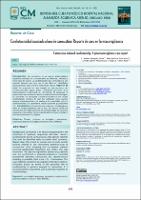Cardiotoxicidad asociado al uso de carmustina: reporte de caso en farmacovigilancia
Related Resource(s)
http://cmhnaaa.org.pe/ojs/index.php/rcmhnaaa/article/view/1470Date
2021-12-31Author(s)
Rodríguez Tanta, Yesenia
Solis Yucra, Tania del Pilar
Wong Chang, Alfredo Gabriel
Failoc Rojas, Virgilio E.
Metadata
Show full item recordAlternate title
Carmustine-induced cardiotoxicity: a pharmacovigilance case report
Abstract
Introducción: La carmustina es un agente antineoplásico alquilante utilizado en el tratamiento de mielomas, linfomas y otros tipos de cáncer. La cardiotoxicidad por carmustina es una reacción adversa muy rara, por lo que debe ser identificada oportunamente para prevenir desenlaces fatales. Reporte de caso: Se presenta un caso inusual de una paciente con cardiotoxicidad aguda grave reversible posterior a la administración endovenosa de carmustina. Al suspender la exposición a este producto e iniciar tratamiento sintomatológico, la paciente se recupera satisfactoriamente sin nueva manifestación cardiaca. El caso fue notificado como reacción adversa medicamentosa y al evaluarse la causalidad entre la cardiotoxicidad y la carmustina, resultó probable (puntaje final =7). Conclusiones: El presente caso puede ser considerado una señal en farmacovigilancia, por lo que, los clínicos deben ser conscientes del riesgo potencial de cardiotoxicidad en pacientes expuestos a carmustina. Se recomienda realizar farmacovigilancia activa a los fármacos oncológicos. Background: Carmustine is an alkylating agent used in the
treatment of myeloma, lymphomas and other cancers.
Cardiotoxicity due to carmustine is a rare adverse reaction
that must be identified early to prevent fatal outcomes.
Report case: We present an unusual case of acute cardiac
toxicity related to the intravenous administration of
carmustine. After stopping the carmustine, patient
received symptomatic treatment and, finally was fully
recovered. The case was reported as adverse drug reaction
and we performed a pharmacovigilance causality
assessment between carmustine and cardiotoxicity,
resulting in probable (final score = 7). Conclusions: This
case might be considered as a signal in pharmacovigilance.
Clinicians should be aware of the potential risk of
cardiotoxicity in patients exposed to carmustine. It is
recommended to implement active pharmacovigilance to
chemotherapy.
Collections
- Artículos científicos [891]






